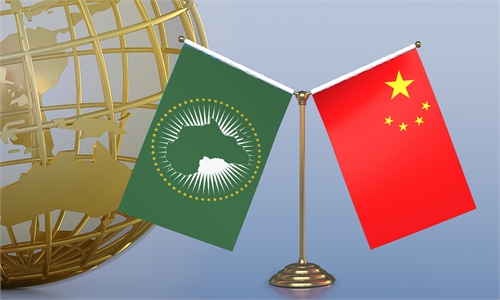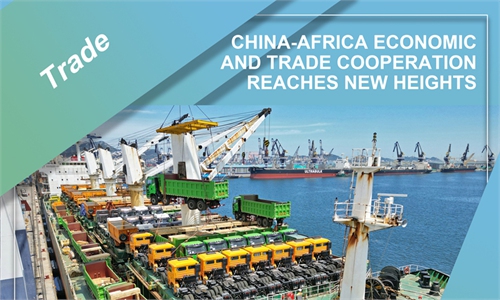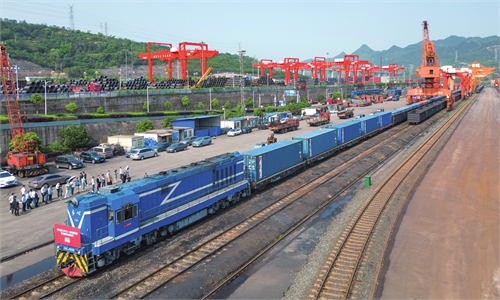
A local worker is working at the Botswana branch of China Jiangxi International Economic and Technical Cooperation Co. Photo: Courtesy of the Botswana branch of China Jiangxi International Economic and Technical Cooperation Co
Fortunate Punungwe, a 20-something African radiographer, starts her daily work on Wednesdays by reviewing the patient list and making sure all the X-ray equipment is set up and working properly. Her work is mainly about using portable devices alongside artificial intelligence (AI) technology to spot tuberculosis (TB) patients in Zimbabwe, where over 40 percent estimated TB cases reportedly go undiagnosed.
The African continent as a whole accounts for 23 percent of TB cases and 33 percent of deaths globally., according to an article published on WHO website.
At the beginning of the year, Zimbabwe in collaboration with Chinese tech company Infervision, applied AI in larger scale in local community TB detection. Punungwe joined the program and received training at that time.
According to her, the wide use of digital technology, especially AI, has been a "game-changer" for Zimbabwe, with far-reaching impact on the country's healthcare system.
"Before, the screening process was slower and relied a lot on the radiographer's experience. Now, with AI, we can analyze X-rays much faster and handle more cases each day without sacrificing quality. This also means patients can get diagnosed and start treatment much sooner, which is crucial in stopping the spread of TB," she told the Global Times on Wednesdays.
Punungwe now could screen about 80 to 150 patients on a busy day. And she believed that the cutting-edge technology imported from China has been "making a real difference" in the lives of local people.
Bilateral cooperation momentum in emerging industries like AI is just a recent example of Chinese companies' active participation in Africa's digital and technological transformation. From building digital infrastructure, launching mobile payment to setting up tech know-how training center, there has been no shortage of evidence underscoring how collaboration between China and Africa complements each other's advantage, leads to win-win result and illustrates South-South cooperation that defies zero-sum mind-set.
This year marks the 11th anniversary of the China-proposed Belt and Road Initiative (BRI), under which China-Africa cooperation flourished. The 2024 Summit of the Forum on China-Africa Cooperation (FOCAC) will be also held in Beijing from September 4 to 6. Industry insiders expected that the summit to build on previous achievements, while unfolding a new chapter of digital and tech cooperation between the two economies that will close Africa's digital divide and open new avenues to propel its modernization and industrialization push.
Cooperation in tech, digital fields
A spokesperson of Infervision told the Global Times on Wednesday that cooperation in emerging sectors like AI has allowed Chinese companies to fully leverage their advantages, taking account of China's expertise in AI good quality data and leading technology advancement. Also, there's capacity building and knowledge transfer throughout the process, which enable local professionals to improve their skills. The company also plans to further advance to more sub-Saharan African region where rates of TB remain high.
China is currently one of the major countries exporting AI technology and products to Africa. The booming AI cooperation also aligns with the development priorities of the African region, where a number of countries have rolled out AI strategies and stepped up investment in digital infrastructure.
Recent estimates suggest that AI could increase boost Africa's economy by $2.9 trillion by 2030 - the equivalent of increasing annual GDP by 3 percent.
"Collaboration between China and Africa in AI and digital technology has the potential to be revolutionary. Some of the African development problems in Africa can be addressed with the help of China's AI tech breakthroughs," Toumert AI, the General Secretary of the China Morocco Friendship Association, told the Global Times.
As the two economies further spearhead cooperation, he also highlighted the massive opportunities that AI technology could unleash for Africa's modernization efforts across several sectors, including agriculture, healthcare, and education.
Observers stressed that as the expansion of digital infrastructure lays the foundation for widespread application of AI, African nations can also benefit from China's experiences in developing and implementing digital infrastructure to further boost their technological capabilities.
In addition to infrastructure, cooperation between China and Africa in the digital sector has takes taken various forms in the past decades, ranging from information devices, mobile phones and internet applications, which have enhanced Africa's level of digital connectivity and brought technological convenience to its residents, a spokesperson of Chinese mobile phone manufacturer Transsion told the Global Times. Transsion accounts for over 40 percent of Africa's smartphone market.
Setting an example
Since 2000 when the FOCAC was formally founded,Since the founding of the Forum on FOCAC in 2000, Chinese companies have helped African countries build a communications backbone network of 150,000 kilometers and a network service covering nearly 700 million user terminals, according to the white paper entitled "China and Africa in the New Era: A Partnership of Equals." white paper.
Botswana's Digital Delta Data Center, undertaken by the Botswanan branch of China Jiangxi International Economic and Technical Cooperation Co (CJIC), is another case of Chinese companies' involvement in Africa's digital infrastructure construction. The two-storey date data center, located at the capital of Gaborone, is another milestone of BRI cooperation and has become the country's largest data center when delivered last year.
Li Qing, the manager of the Botswanan branch, told the Global Times that the data center is vital to ensuring Botswana's network data security.
"Network data exchange will no longer be conducted through data centers in other countries. Meanwhile, the internet speed is also expected to greatly improve, which in turn will significantly promote the development of network transaction, data mobile payment, contributing to digital economy growth in Botswana," Li noted.
Africa is a "blue ocean market" with a population exceeding 1.4 billion. It also has the world's youngest population, meaning that its digital economy has great potential and will expand steadily with the penetration of digital infrastructure, the Transsion spokesperson said.
"We look forward that the upcoming summit will deepen bilateral ties and usher a new chapter of cooperation between China and Africa, especially leading to substantial, deeper development in digital and technology fields," the spokesperson said, stressing that China will play an even greater role in Africa's future digital transformation.
While certain Western forces have been spreading false narratives around China-Africa cooperation and stigmata slandering on digital collaboration, observers stressed that China's engagement with Africa is based on mutual benefits and mutual respect, and is voluntary.
"China's approach, which addresses Africa's genuine needs at heart, is fundamentally different from certain Western countries' whose moves which are out of zero-sum and hegemonic mind-set," Song Wei, a professor at the School of International Relations and Diplomacy at the Beijing Foreign Studies University, told the Global Times.




